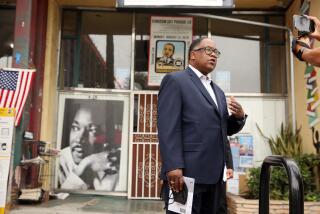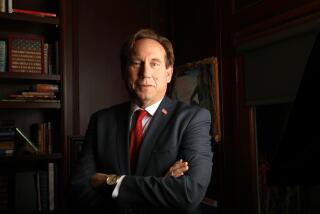Herschensohn Blasts Congress, Joins Senate Race : Politics: The GOP candidate for Democrat Alan Cranston’s seat weaves the Clarence Thomas hearings and congressional check-writing abuses into a denunciation of incumbents.
- Share via
Republican Bruce Herschensohn formally joined the 1992 race for the U.S. Senate on Monday by blasting Congress as imperially arrogant, a preview of a theme that is likely to be commonplace in the upcoming election year.
Herschensohn’s announcement was no surprise because the 59-year-old former television and radio commentator had been campaigning since April. But its theme was timely--coming after a turbulent weekend of Senate hearings into the Clarence Thomas nomination, which left many with a distaste for Washington politics.
The GOP candidate, making his second straight bid for the seat soon to be vacated by Democrat Alan Cranston, wove the Thomas hearings and the recent controversies over House check-writing and restaurant privileges into an anger-laced denunciation of incumbents. One of Herschensohn’s GOP rivals and two of his potential Democratic opponents are members of Congress.
“The Congress lives like royalty,” he said. “With the kind of perks that people in the House of Representatives and the Senate have, it is unlikely that they really understand what the average American goes through.”
Herschensohn excoriated Democrats on the Senate Judiciary Committee for what he said was “just despicable” behavior during the Thomas proceedings. He made clear he did not believe the allegations made by law professor Anita Faye Hill. Women, he said, should make such accusations immediately after the alleged event, and should not be able to publicly come forward years afterward, as Hill did.
Asked whether that would place an unfair burden on harassed women--because women make less money than men and would be less able to afford legal action and face the loss of a job--Herschensohn angrily disagreed.
“Of course, poor people are going to be able to do less than people that have more money,” he said. “What do you want to do about it, change the system to socialism? That’s how capitalism operates.”
The former commentator began airing on Monday a 60-second radio campaign commercial, the first of the campaign season. Currently running only in Los Angeles, the ad may be run later in other markets. He pledged as well to limit his television and radio advertisements to simple explanations of his positions.
“It’s not going to be me walking on the beach or walking in the forests with a bunch of violins in the background, “ Herschensohn said. “There’s no orchestra in the Senate. There’s no reason to have sand in your shoes.”
While firmly proclaiming his desire to capitalize on what he called a wave of anti-Congress disgust, Herschensohn is not joining those who propose congressional term limits. He said such restrictions limit only the public.
Herschensohn’s announcement--delivered first in Los Angeles and later in Sacramento--emphasized the Thomas hearings and the anti-imperialist theme, but his radio advertisement struck a number of notes.
In it, Herschensohn advocated a flat rate tax for all Americans, to replace the current sliding scale of income taxes. Without further explanation, he also said he wanted to “stop the endless, endless appeals of convicted criminals who now have more rights than victims.”
Herschensohn said commercials were aired eight months before the June primary to inspire donations. “Look, I need campaign funds,” he said.
Indeed, Herschensohn’s fund raising lagged far behind his major GOP competitor when campaign finance reports were released in July. At the time, U.S. Rep. Tom Campbell of Stanford had raised $1.1 million and had $1.4 million on hand. In contrast, Herschensohn had raised $188,842 and had less than $152,000 on hand.
The former commentator--who resigned his radio and television jobs two weeks ago to devote more time to fund raising--said that his campaign now has collected about $750,000.
More to Read
Get the L.A. Times Politics newsletter
Deeply reported insights into legislation, politics and policy from Sacramento, Washington and beyond. In your inbox three times per week.
You may occasionally receive promotional content from the Los Angeles Times.











